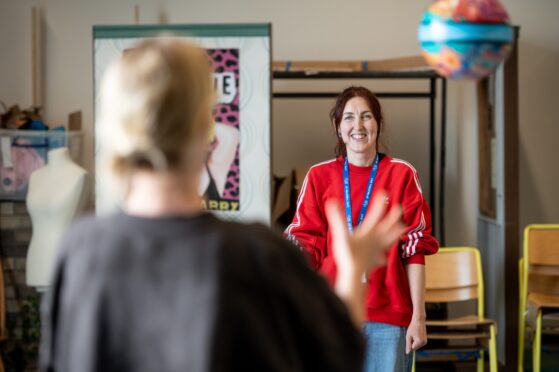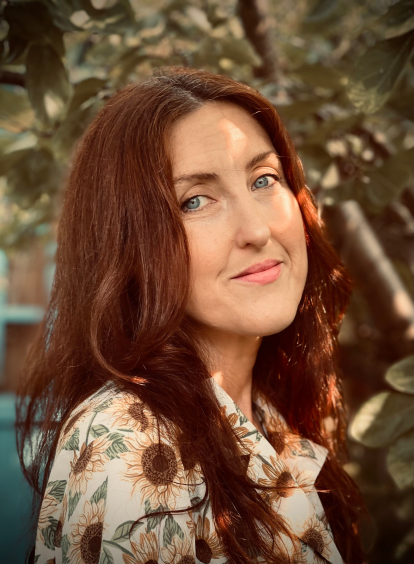
As Rae Mainwaring prepared to watch a run-through of Bright Places, the play she’d written about her MS diagnosis, she thought she’d felt all the feelings she could about it after 20 years.
But as the story of a young woman getting shattering news was brought to life in the rehearsal room, it brought everything back.
Having grown frustrated by the negative depictions of people living with the condition, Rae explores the impact of her diagnosis in a glittering production.
With a 90s pop soundtrack and a dazzling costume box, it’s a raw, honest and funny autobiographical story about growing up in the shadow of chronic illness.
“I was quite naïve initially. I thought I’d be fine,” she said. “Obviously that was completely wrong and revisiting it was quite hard, being in a room while somebody else is performing an incredibly difficult moment in your life over and over again.
“I wanted to do this honest, autobiographical piece, but that’s a very exposing, daunting place to put yourself in.
“I want to make sure that people with MS come and see it and feel I’ve done a good job.”
MS journey
Rae was diagnosed aged 23, having first started experiencing symptoms a few years prior to going to university.
“To start with, they can be so easily assumed to be something else,” she said. “I was having a lot of headaches and numbness in my face. I was building up to doing my exams so the doctors thought it was probably stress-related.
“I had an MRI scan but then I moved so I didn’t get the results. It wasn’t until my symptoms picked up again a year later that I went to A&E and they said there was something on my scan.”
She was diagnosed with relapsing remitting MS, where periods of symptoms getting worse -relapses – are followed by periods of recovery.
After each relapse, the disability can end up worse than before as the body finds it harder to repair the damage, especially without treatment.
“For the first ten years, it was going from one relapse to another to another,” Rae said.
“It was a big shock having just come out of university, imagining you’ll go off and do all these things. You’re breaking free into the adult world but I did the opposite and my world became really small.”
The diagnosis was 20 years ago, a time where working in the arts with a chronic illness or disability didn’t seem as possible as it does today.
But starting the run in Birmingham’s Rep theatre last week, where Rae worked as a dresser when she was diagnosed, has brought it all full circle.
“For a long time my way of coping with it was to almost act like nothing’s changed, just carry on,” she admits. “I didn’t want to go to support groups. I just wanted everything to stay the same.
“But you become really aware of time because MS is so unpredictable. You don’t have a five or ten year plan because you just don’t know what’s going to happen.
“It makes you more driven to want to do things because there’s always this fear in the back of your head that life could change quite quickly.”
Living with the condition
In the two decades since being diagnosed, mother-of-two Rae has seen amazing medical advances when it comes to living with and managing the condition.
While there’s no cure, treatment can slow down the progress and reduce the amount of relapses.
In the early days, many were injection based and self-administered, with often huge side effects.
“I took a huge break when I had my children and decided to come off medication altogether. But I’m back on treatment now and things have advanced so much. I’m on a treatment I only have to have twice a year. I go into hospital for one day and have it as an intravenous drip. It’s so much easier.”
Rae still has to deal with some of the symptoms the condition throws at her, especially the extreme fatigue.
“There’s no medication for that,” she said. “It’s about learning how you manage it yourself.
“Most of my symptoms are quite sensory. I get pins and needles in my limbs and sometimes my legs can get very heavy if I’m tired.
“When I was first diagnosed, I had a lot of relapses that really affected walking and my hands. These days it would be less visible, but they’re no less debilitating because even though something sounds really minimal, like pins and needles in your hand, it’s all the time. All day long. It’s a distraction.
“If you’re trying to work or trying to concentrate it’s quite exhausting. Brain fog as well is something I find difficult as a writer.”
Bright Places
Bright Places is touring across the UK in the coming weeks, including a stop at Edinburgh’s Traverse Theatre.
It sees three actors take on three different versions of Rae as they put together their own play on MS.
“It’s a slightly surreal and funny way of looking at an almost coming of age story,” she said. “What do you do when you have an idea of how you think your life is going to turn out and then something changes that? It’s quite a universal feeling whether you live with chronic illness or not.”
Rae wrote the play after feeling that she couldn’t relate to other MS roles on stage and screen.
It will run alongside a community engagement project with creative writing workshops for people whose lives are affected by chronic illness.
“Our darkest times are often our funniest,” she said. “As well as people hopefully learning a bit more about MS and how having invisible conditions can affect you, they can have a really good fun night at the theatre.”
It’s not just Rae in the team who has MS, with cast member Rebecca Holmes and associate director Natallia Bulynia also living with the condition.
“It was nice to not be the only person in the room who has that as their lived experience,” she added.
“It’s probably the biggest representation for MS in an arts creative team! It feels really lovely when you’re with a load of people that really get it.”
MS awareness
Just as medical advancements have progressed in the past 20 years, so too has society’s attitude towards MS.
While Rae still believes it’s a misunderstood condition, she feels like people with chronic illness and disability on social media are making a big difference.
“There are so many brilliant young disabled influencers on Instagram who are dispelling a lot of myths.
“When I was diagnosed, there was definitely a sense that it was more about people who were middle-aged. Nobody was fashionable if they were ill.
“Now you’ve got these brilliant young people who are make making things feel more accessible, talking about things like mobility aids in a way that doesn’t feel negative.
“For MS, the big change has been two quite big Hollywood names diagnosed recently in Christina Applegate and Selma Blair.
“It’s a very different life and access to medical care if you’re living with lots of money in LA, but there’s something really empowering about seeing somebody with MS looking really glamorous with their mobility aid on the red carpet.
“I think if I’d seen that, it wouldn’t have felt so end of the world.
“We do still have a lot of ingrained ableism that we need to shake off. There’s a lot of stuff to unpick there about, for example, how we as a society have the idea that if you’re not able to work full time, then you must be lazy.”

Enjoy the convenience of having The Sunday Post delivered as a digital ePaper straight to your smartphone, tablet or computer.
Subscribe for only £5.49 a month and enjoy all the benefits of the printed paper as a digital replica.
Subscribe © Graeme Braidwood
© Graeme Braidwood